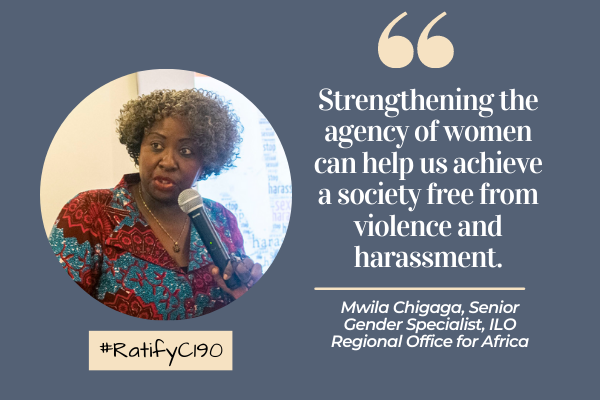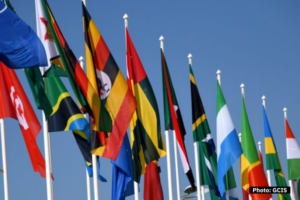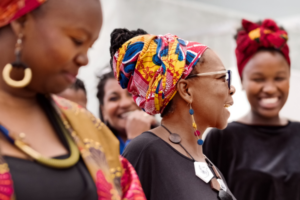Webinar panellist and ILO Regional Specialist for Gender, Mwila Chigaga, stated why Convention 190 and Recommendation 206 are game-changers in combating violence and harassment in the world of work. Watch the FEDUSA’S GBV webinar. Sign FEDUSA’s #C190CAN petition
Why is the ILO Convention 190 and Recommendation 206 a game-changer in ending violence and harassment in the world of work?
Violence and harassment in the world of work are prevalent and manifest in different forms and contexts. The Violence and Harassment Convention No.190 (C190) is the first international labour standard on violence and harassment in the world of work to be adopted. By adopting the convention, the global community made it clear that violence and harassment in workplaces will not be tolerated and must end. Recommendation No. 206 offers guidance on the implementation of C190 and has core principles, such as;
- violence and harassment need to be addressed in labour and employment, occupational safety and health, equality and non-discrimination law, and in criminal law where that is appropriate. The instruments essentially criminalise violence and harassment in the world of work. Member States are required to look at their penal codes and laws and determine whether it’s appropriate to criminalise it.
- the right to collective bargaining as a means of addressing and preventing violence and harassment. We now need to ensure that collective bargaining agreements integrate issues of violence and harassment.
- prevention of all forms of violence and discrimination in the world of work. Occupational safety and health provisions on violence and harassment should be taken into account in the national laws, regulations and policies. Member States are required to take stock of the existing laws, policies and regulations and align them with the provisions of C190.
- a clear stipulation of the complaints and investigating procedures of cases. Complainants, survivors, witnesses and whistle-blowers are protected against victimisation or retaliation. The complaints mechanism includes measures such as access to legal expertise in a court of law and compensation for damages to complainants. This has been lacking in many situations.
- shifting the burden of proof on the perpetrator. This is revolutionary, and considering that the perpetrators of gender-based violence and discrimination are often people in positions of power.
- provisions for coming up with codes of good practice, guidelines and training programmes. Worker organisations and employers must be able to show governments that they are committed to doing their part concerning the requirements of the ILO instruments on eliminating violence and harassment. Do our institutional frameworks and gender policies support the integration of the provisions of Recommendation 206, or do we need to design separate policies? We need to first get our houses in order to show governments that we are willing to enforce the provisions of C190 and Recommendation 206.
What approach should we take to clearly understand Convention 190?
It’s important to view C190 in the context of the prevailing gender dynamics in society. Gender inequalities and discrimination are still entrenched in our society. The prevalent violence and harassment in homes and workplaces is a symptom of the underlying root causes originating from our socialisation. Both men and women have certain perspectives stemming from cultural beliefs and values. Patriarchy still exists – the violence and discrimination in workplaces are due to the power relations in our society. We are who we are socialised to be and so we enter workplaces with our socialisation intact. We need to understand violence and discrimination as mere symptoms of underlying root causes.
What is causing Member States to delay their ratification of C190?
Political will and commitment are needed to bring about the ratification of C190. We need to question why the political will isn’t being demonstrated, yet we all agree on the magnitude and impact of gender-based violence. We need to unpack the term political will and establish if there are unconscious biases that need to be dealt with.
Trade unions successfully advocated for the inclusion of the ratification of C190 in South Africa’s parliamentary agenda in 2019. The intention was to have the country be the first to ratify the convention in Africa. South Africa must expedite the ratification of the convention. I am confident that C190 and the accompanying Recommendation will be a game-changer in the fight against gender-based violence and discrimination.
Why does ratification of C190 matter?
A ratification is a sovereign act of a Member State of the ILO expressing its intention to be bound by the terms of an international labour Convention. By ratifying C190, South Africa would accept to implement the convention without reservation and be held accountable by the global community, through regular reporting to the ILO. It would also open the ILO complaints procedure to citizens who feel that the provisions of C190 aren’t being implemented.
What else is required to successfully implement C190?
Gender-based violence issues are difficult and traumatic. Women’s empowerment is one of the best strategies for ending violence. We must invest in strengthening the agency of women through education. The existing interventions depict women as victims. We need to change this mindset and empower women to take control of their lives. Strengthening the agency of women – increasing their capacity to understand and demand their rights in workplaces – will help us to achieve a society free from violence and harassment. We are agents of change and with effective leadership, it can be done. Together, we can.







